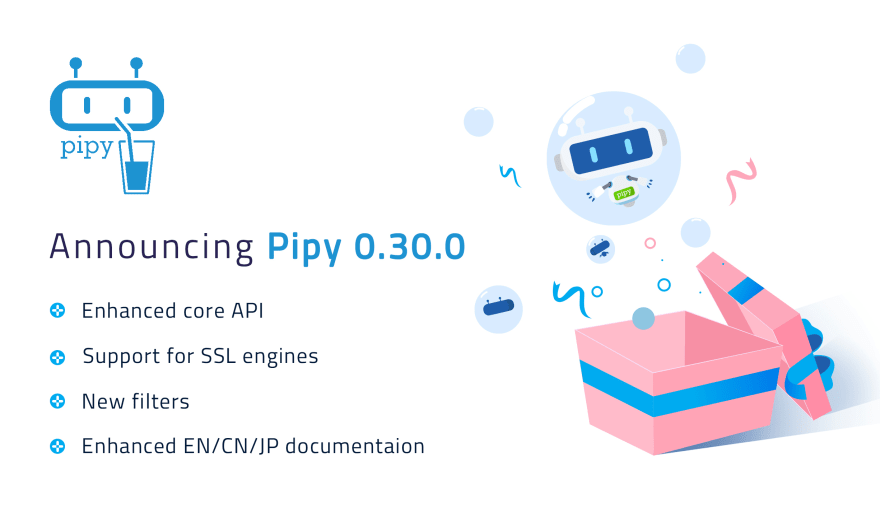Pipy 0.30 is now available. It adds improvements to a number of areas including better documentation, more core controls, new filters, enhanced Cache and Metrics API, and some bug fixes. The Pipy Runtime API has expanded its coverage of SSL engines, asynchronus file read/write operations.
This release was truly a community effort and could not have been made possible without all of the hard work from everyone involved in active discussions and the Pipy project on GitHub.The Pipy community provides code submissions covering new functionality and bug fixes, documentation improvements, quality assurance testing, continuous integration environments, bug reports, and much more. Everyone has done their part to make this release possible! If you’d like to join this amazing community, you can find it on GitHub, Slack, and the Pipy discussion groups.
In the following sections, you will find a full list of changes included in this version.
Core
- Add flow control mechanism for throttling any types of input
- Add asynchronous file operations
- Support OpenSSL engines
Filters
- New filter tee
- New filter
throttleConcurrency - New filter
demux(legacydemux/muxfilters are renamed todemuxQueue/muxQueue) - Filter
decodeMQTTto supportprotocolLeveloption - Throttle filters support weak references as the account keys
API
- Support TTL option for
algo.Cache - New method
stats.Metric.valueOf()for querying current metric value -
Data.from()rejects input types other than strings
Major bug fixes
- Fixed a bug where TLS requests could be stuck in the buffer
- Fixed a dead loop when trying to read folders in codebases
- Fixed some crashes when null is given to some cypto APIs
- Fixed a crash when retrieving stats.Histogram sub-metrics
- Fixed a bug where an HTTP 304 response would lead to forever waiting on the connection
- Fixed a bug in
Data::shift_while()that caused Dubbo decoding failures - The size of Data wasn't changed accordingly in some cases when packing
Build
- Support static linking to
libc - Support linking to external
zlib
Documentation
Tremendous growth in documentation coverage has been done since the last release in English, Chinese and Japanese.
We would like to thank each and every contributor who was involved in this release.




Top comments (0)